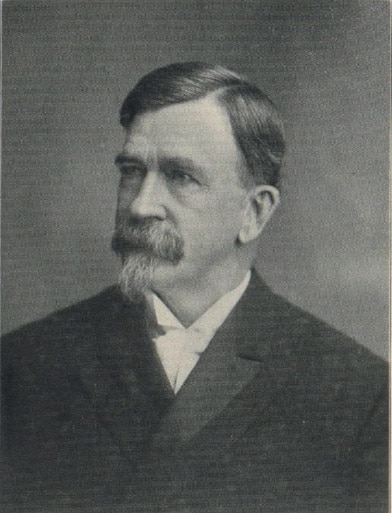
Yonkers Superintendent of School Charles E. Gorton, often called The Father of the Yonkers School System. He was with the Yonkers Schools for a few months short of 50 years.
By Mary Hoar, City of Yonkers Historian, President Emerita Yonkers Historical Society, recipient of the 2004 Key to History, Member of the Yonkers Landmarks Preservation Board, and President Untermyer Performing Arts Council
Monday, April 24th
April 24, 1935: Yonkers and Westchester County were hit with a wave of food poisoning; Yonkers alone had 75 cases! Officials blamed Cushman Sons Bakery; everyone affected had either a cream puff or éclair at dinner. Yonkers’ City Laboratory staff Dr. Frederick Weedon and Florence Knacke fed a piece of pastry to a little white mouse.
April 24, 1943: Aranya Smart, Chairman of the Women’s Division of the Yonkers War Savings Staff, announced results of the Yonkers Schools-at-War Jeep Campaign: Yonkers schools sponsored 38 Army jeeps! School Fifteen’s bond drive, “The Sky’s the Limit,” raised enough to purchase 15 jeeps; School Seven financed seven. School Twenty-Six, with only 100 pupils, financed five jeeps.
Tuesday, April 25th
April 25, 1917: Schools Superintendent Charles Gorton was pleased to learn more than four thousand students were cultivating gardens, not only at home but on every vacant plot of land they could find! Addressing the high school boys, he suggested they take summer jobs on upstate farms, guaranteeing every boy reporting to farm work after May 1st would receive full credit for the academic year. Applications for farm positions were passed out with a guarantee New York authorities would place them in the farming type they were interested in, whether dairying, general farming, or truck farming. To aid the cause, Trades School Principal Joseph Eaton borrowed picks, shovels and gardening tools in poor condition from DPW. His students restored them, working in teams in the school shops from early morning until night.
April 25, 1935: Yonkers food poisoning cases more than doubled to 156 cases, and tripled in the rest of the county, officially making this the worst food poisoning epidemic in the history of Westchester. Bacteriologists in five laboratories worked on the investigation, analyzing pastries. The Cushman bakery, believed the epidemic source, was tested and pronounced clean; investigators found no trace of bacteria in the plant.
Wednesday, April 26th
April 26, 1935: As the Yonkers Health Laboratory tests narrowed the field to two main possibilities of Staphyloccus and the paratyphoid group, Yonkers now had 175 cases of food poisoning, and the county had 703.
April 26, 1937: Hawthorne Junior High School graduate Leslie Klein starred in the Broadway production of “Dead End” at the Bellasco Theater under the name Leslie Barrett. The show was about adolescents who grew up during the Depression, graphically depicting their lives. It was the first project featuring the “Dead End Kids,” later brought to the movies without Barrett.
Barrett appeared in several Broadway productions, including “Primrose Path” (1939), “Rhinoceros” (1961) and “The Dresser” (1981); an accomplished Shakespearean actor, he was a member of the Shakespeare Theatre Workshop under the direction of Joseph Papp. He was a founder of the American Mime Theater and appeared in several TV programs, as varied as “The Twilight Zone,” “Dennis the Menace,” “Dark Shadows,” and “The Honeymooners.”
Thursday, April 27th
April 27, 1861: The first company of Yonkers Civil War volunteers marched down Main Street through a vast number of cheering Yonkers well-wishers to the railroad station to leave for battle.
April 27, 1935: Yonkers Health Commissioner Clarence Buckmaster announced Dr. Frederick Weedon, Yonkers City Laboratory, identified the bacteria responsible for causing the food poisoning epidemic was staphylococcus. Weedon also found a large number of toxic coli. The next step was to determine where the bacteria entered the food.
Friday, April 28th
April 28, 1908: After receiving word Governor Hughes signed the Yonkers Manor Hall bill to preserve the structure as NY State property, it was announced Eva Smith Cochran donated $50,000 for the purchase of the property, with an additional $5,000 for any needed repairs when Yonkers finally vacated the property. At that point, the Manor Hall had been used for thirty-six years as a municipal building. The last department left for City Hall in 1911.
April 28, 1933: Ninth Ward Alderman William Slater brought national attention to Yonkers when he initiated his anti-shorts campaign in Yonkers. Declaring the girls, “so scantily clad they would make the Angel Gabriel blush,” were offending the residents of his ward. Slater said girls were picnickers who left the New York Aqueduct at McLean Avenue to wander Yonkers streets clad in “short pant.”
Saturday, April 29th
April 29, 1921: Yonkers tennis star Vince Richards was ranked third in the country by the United States Lawn Tennis Association; Bill Tilden and William Johnson were ranked #1 and 2.
April 29, 1935: Because of the food poisoning epidemic, County Health Commissioner Matthias Nicoll announced he would ask the Westchester Board of Health to ban sale of custard cream-filled baked goods during the summer. Twenty-five additional cases erupted at the Jennie Clarkson Orphanage, raising the county toll to 772 cases. The County now believed it was caused by toxic Coli, or intestinal parasites.
Sunday, April 30th
April 30, 1935: New York State Health Laboratories reported they had found the same toxic bacteria causing the county-wide food poisoning in unopened cans of eggs! Dr. Edgar Maillard reported guinea pigs and white mice fed the eggs died within 24 hours. That morning, the County Board of Health banned the manufacture and sale of custard filled pastry “until further notice.”
April 30, 1935: Mayor Joseph Loehr signed two historic documents notifying the Yonkers Railroad Company the city intended to end a franchise agreement in one year. Yonkers had issued the franchise to former Mayor Leslie Sutherland in 1911 for one dollar.
Questions or comments? Email YonkersHistory1646@gmail.com. For information on the Yonkers Historical Society, Sherwood House and upcoming events, please visit our website www.yonkershistoricalsociety.org, call 914-961-8940 or email info@yonkershistoricalsociety.org





